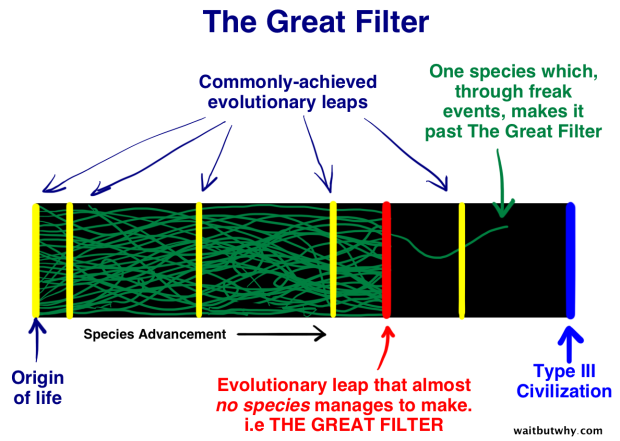Exploring Human Intelligence and the Quest for Extraterrestrial Life
Written on
Chapter 1: The Enigma of Intelligence
The question of where humans stand on the intelligence spectrum remains elusive. Are we at the pinnacle, or merely at a modest level?

Photo by Saketh Garuda on Unsplash
The universe holds numerous enigmas that are difficult to unravel. Consciousness, for instance, remains a mystery—its very existence is still debated. Then there's dark matter and dark energy, which comprise around 95% of our universe's content yet remain largely ungrasped. Other questions linger: What existed before the 'Big Bang' 13.8 billion years ago? What lies beyond the observable universe? And what about life? How prevalent is intelligent life in the cosmos—common, extremely rare, or somewhere in between?
The extent of life beyond Earth is still a significant unknown. It could very well be that Earth is the sole cradle of life, or it might be that planets similar to ours harbor life forms—perhaps simple molecules that have managed to reproduce sustainably. The definition of life itself is often contested. It's conceivable that extraterrestrial life exists in forms beyond our comprehension.
As of now, we lack definitive knowledge about the existence of life elsewhere. However, the coming decades may bring clarity, with potential breakthroughs on the horizon. NASA's Mars 2020 Rover mission aims to investigate past habitable conditions and search for microbial signs of life on the Red Planet. Should evidence be discovered that isn't linked to Earth, it could be a groundbreaking revelation—arguably the most significant in human history.
As we advance further into this century, exploration of our Solar System is expected to intensify, especially with nations like China, India, and Russia vying for space dominance. A new space race has commenced.
Beyond the confines of our Solar System, speculation abounds regarding when and how humanity might reach out to the stars.
The Great Filter
Even if we encounter life, a pivotal question arises: will it be intelligent? We might define intelligence through our ability to communicate over vast distances or through complex language. Alternatively, the use of tools could suffice as a benchmark.
It’s plausible that no other life forms beyond Earth have achieved such milestones. Could we be the first intelligent beings in the galaxy? Given the universe's vastness, this seems surprising, yet indicators might suggest otherwise.
It’s conceivable that if life exists elsewhere, it may not evolve to a point where it can communicate beyond its home planet. This could be due to a critical evolutionary leap that proves challenging to traverse—from simple molecules to multicellular organisms and then to intelligent beings. This theory posits that a 'Great Filter' exists, hindering life from advancing beyond a rudimentary stage, making the emergence of intelligent life exceedingly rare.

This Great Filter could explain our lack of contact with advanced extraterrestrial civilizations. The rationale is that if sophisticated life did exist, we might have already detected it through communications or even observable phenomena, such as changes in the brightness of distant stars due to energy harnessing.
These assumptions are drawn from our own trajectory as a species. Assuming we continue to evolve technologically and scientifically, it’s anticipated that we could eventually colonize the galaxy or, at the very least, become detectable from vast distances.
If not current humans, then perhaps genetically enhanced humans or even advanced robots powered by General Artificial Intelligence might take on this role.
Intelligence: A Comparative Analysis
Another profound mystery lies in our perception of our intelligence. While we label ourselves as intelligent, it’s crucial to consider the organ that makes this claim—our brain, which may possess an inflated sense of self-importance.

Photo by Charles on Unsplash
The human brain can only compare itself to other Earth species. We consider ourselves intelligent due to our ability to perform tasks that seem complex to us, especially when juxtaposed with simpler organisms like bacteria and rodents.
The evidence of our superiority lies in our capability to execute nearly all simple tasks that other species can manage (albeit with the aid of tools), while also accomplishing advanced feats such as technological innovation, aviation, and space travel. In fact, other species likely cannot even conceive of these possibilities.
However, even if we are advanced compared to our fellow Earthlings, we may still pale in comparison to more evolved beings elsewhere in the universe. This disparity may explain our struggles to grasp fundamental concepts like consciousness or the majority composition of the observable universe. These realities may be quite clear to a far more intelligent entity, much like how humans can comprehend the International Space Station, while cats cannot even begin to fathom it.
How Do We Measure Intelligence?

Photo by Isaac Smith on Unsplash
Determining where humans rank on an intelligence scale within the universe is a complex task. We have developed IQ as a means of ranking intelligence among humans (and other animals). Reports suggest that cats and dogs have IQs ranging from 10 to 20, while apes might reach 60 to 70. Some humans fall within that range, while others, like Ainan Celeste Cawley, a prodigy with a purported IQ of 263, are said to be among the highest ever recorded.
If we accept IQ as a valid measure, it suggests that humans are approximately ten times more intelligent than cats and dogs. This order of magnitude grants us significant advantages—solving complex problems, manipulating matter, escaping our planet, curing diseases, and even engineering life itself.
Now, imagine if humanity were an order of magnitude smarter, with IQs soaring to 2000. Could we unravel the mysteries of consciousness? Could we discover additional dimensions or travel faster than light? Might we find life in the most unexpected corners of the universe?
With such advancements, we would likely tackle many of these challenges or at least gain a deeper understanding of them. However, we would also encounter new complexities that currently elude us, fundamentally altering our way of thinking. We are constrained by our biological capacities, limiting our understanding of an entire reality we cannot even begin to perceive.
What Lies Ahead?
While our biological limitations are a factor, humanity’s quest for knowledge and improvement remains relentless. We are on the brink of potentially transformative discoveries in the coming decades, though their exact nature remains uncertain.
To transcend our current limitations—be it in our minds, bodies, galaxy, or even the universe—we may require a significant leap in intelligence. This evolution is unlikely to occur naturally in the near future, necessitating advancements through AI, genetic engineering, and a collective goodwill towards us, the simple Sapiens.
Chapter 2: The Origins of Human Intelligence
In the video "Where Did Human Intelligence Come From? | STUFF YOU SHOULD KNOW," the origins of human intelligence are explored, delving into evolutionary and environmental factors that have shaped our cognitive abilities.
In "Yuval Noah Harari: Human Nature, Intelligence, Power, and Conspiracies | Lex Fridman Podcast #390," Harari discusses the interplay between intelligence, societal structures, and the implications of our cognitive evolution.